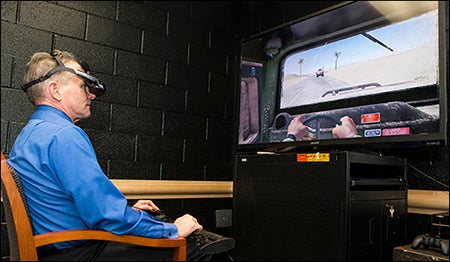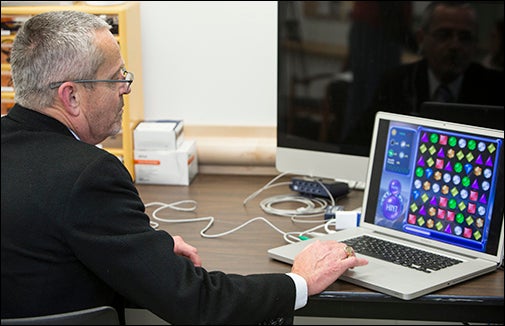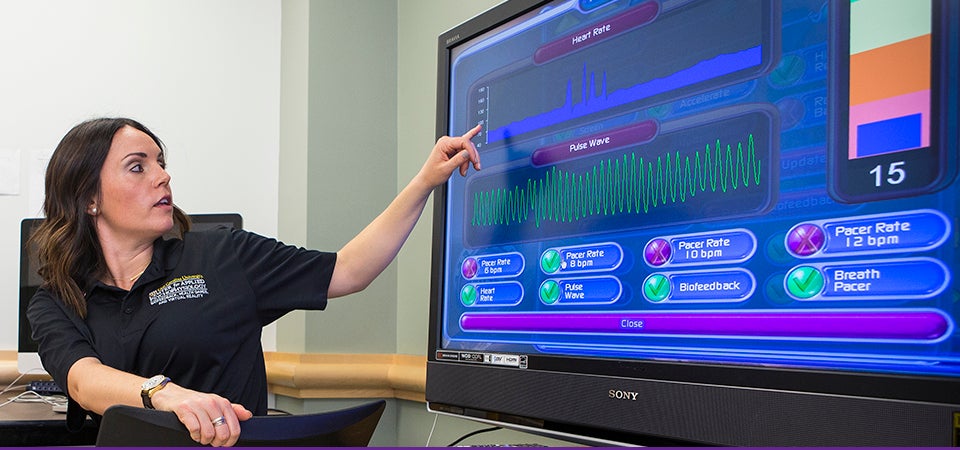TOOLS FOR RECOVERY
Center officially opens to help military personnel recover from PTSD, related conditions
Jeff Zyburt’s virtual reality goggles helped him experience the sensation of steering a military vehicle down a dusty road in a combat zone.
Zyburt tried to avoid enemy fire while testing the device March 20 at the grand opening of East Carolina University’s Center for Applied Psychophysiology. Housed in the College of Health and Human Performance, the center uses a combination of gaming technology and biofeedback techniques to help returning U.S. military personnel recover from posttraumatic stress disorder and traumatic brain injury.

Jeff Zyburt wears virtual reality goggles while steering a vehicle in the opening of ECU’s Center for Applied Psychophysiology.
“You can see where someone who had been through it would be ducking,” said Zyburt, who operates a nonprofit for veterans and their families with his daughter, Tonia Zyburt, who earned a master’s in recreational therapy and trained with Dr. Carmen Russoniello, director of the center.
Researchers at ECU have found video games, virtual reality and biofeedback can reduce the symptoms of PTSD and other psychological conditions that interfere with quality of life. ECU was the first accredited university to offer a graduate certificate in biofeedback.
ECU serves as a teaching hub for clinicians in addictions and rehabilitation studies, recreational therapy, counseling, medicine, nursing and other disciplines how to use the different therapies, to measure and monitor patient progress and improve wellbeing.
Creating partnerships has been at the core of the interdisciplinary center, more than 15 years in the making, said Russoniello, a former Marine machine gunner and decorated Vietnam combat veteran who directs a biofeedback program for Wounded Warrior Marines at Camp Lejeune.
Doctoral students work with Marines two days a week in Jacksonville, and also see clients in Greenville.
The virtual reality room features a big screen where clients strap on a headset and handheld device used to navigate different simulated scenarios. The floor beneath them will start vibrating and a scent machine can create the aroma of motor oil, burning rubber, weapon fire, garbage – even body odor.
“We find scientifically that smell goes directly to the hypothalamus, to the brain,” Russoniello said. “It’s very powerful. We learn an awful lot about each other through smell.”

Center director Carmen Russoniello demonstrates the video game that helps veterans recover from wartime experiences.
Participants become completely immersed in the setting. “That’s where we start to see people get really emotional,” he said, remembering a colonel who had been deployed seven times. “To him, it brought back all the fear. That’s what we want to deal with – employing some techniques to control those emotions.”
Bill Butler served in the Marine Corps for 30 years. He now works at the veteran’s center in Greenville. “We use this technology with combat vets,” Butler said about a game that resembles Bejeweled, a tile-matching puzzle video game.
An ear clip measures heart rate as a person plays the game. Resulting “stress” scores are saved to measure progress.
“A big benefit here is that if you ask someone what stresses them, each one will give you a different response,” said ECU doctoral student Christine Brown-Bochicchio. “But in doing something like this, we’ll see a very objective measurement.”
Butler said the therapy helps veterans work through feelings of self-doubt, anger and isolation. “We get in the weeds with them,” Butler said.
The center recently received a Department of Defense grant to study the efficacy of the heart rate variability biofeedback training program. The center also is developing and testing a mobile neurocognitive assessment and training system for the defense department.
Russoniello and his staff have helped analyze data for the Zyburts, who operate the Florida-based Warrior Institute, which offers a combination of recreational therapy and biofeedback training.
“Every veteran is different. Some respond to canoeing or open water,” Zyburt said. “We are giving them more tools to manage their stress. You can see and feel that it’s good for them.”
For more information on ECU’s program, go to www.ecu.edu/biofeedback.

The screen view on the virtual reality simulation used to recreate wartime experiences such as steering a military vehicle through a combat zone.
